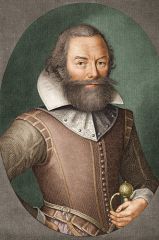![]()
![]()
![]()
Use LEFT and RIGHT arrow keys to navigate between flashcards;
Use UP and DOWN arrow keys to flip the card;
H to show hint;
A reads text to speech;
25 Cards in this Set
- Front
- Back
|
Thomas Harriot
1560-1621 "A Brief and True Report" |

Who am I?
|
|
|
Thomas Harriot's piece
|
"A Brief and True Report of the New Found Land of Virginia" from Of the Nature and Manners of the People 1588
|
|
|
"A Brief and True Report of the New Found Land of Virginia"
Key Quote: Binding Love |
"We sought by all means possible to win them by gentleness" (Thomas Harriot 81)
|
|
|
"A Brief and True Report of the New Found Land of Virginia"
Key Quote: Unbinding Violence |
"Those that were to immediately come after us they imagined to be in the air, yet invisible and without bodies , and [imagined] that they by our entreaty and for the love of us, did make the people die in [the way] they did, by shooting invisible bullets into them" (Thomas Harriot 82).
|
|
|
"A Brief and True Report of the New Found Land of Virginia"
Key Quote: Coding Love |
"There is good hope they may be brought through discreet dealing and government to the embracing of the truth, and consequently to honor, obey, fear, and love us" (Thomas Harriot 83).
|
|
|
John Smith
1580-1631 The General History of Virginia, New England, and the Summer Isles 1624 A Description of New England 1616 New England Trials 1620. 1622 |

Who am I?
|
|
|
1588 - Thomas Harriot - A Brief and True Report of the New Found Land of Virginia
Thesis |
Harriot offers a mixed message with regard to the new found land: he seeks to bind it in love and obedience, to bring the one truth at the same time that he propagates the myth of invisible bullets.
|
|
|
Prologue: The Tenth Muse, Lately Sprung Up in America
Opening stanza |
To sing of wars, of captains, and of kings,
Of cities founded, commonwealths begun, For my mean pen are too superior things: Or how they all, or each their dates have run Let poets and historians set these forth My obscure lines shall not so dim their worth. |
|
|
Contents of The Tenth Muse, Lately Sprung Up in America
|
Of the Four Ages of Man
A Dialogue Between Old England and New; Concerning their Present Troubles, Anno, 1642 The Vanity of All Worldly Things |
|
|
William Perkins four sermon things from his The Art of Prophecying (1592)
|
"1. To reade the Text distinctly out of the Canonicall Scriptures.
2. To give the sense and understanding of it being read, by the Scripture itself. 3. To collect a few and profitable points of doctrine out of the naturall sense. 4. To apply (if he have the gift) the doctrines rightly collected, to the life and manners of men in a simple and plaine speech." |
|
|
1630 -- John Winthrop – “A Modell of Christian Charity”
|
“Love is the fulfilling of the lawe, not that it is enough to love our brother and soe noe further but in regard of the excellency of his partes giveing any motion to the other as the Soule to the body and the power it hath to sett all the faculties on worke in the outward exercise of this duty as when wee bid one make the clocke strike he doth not lay hand on the hammer which is the immediate instrument of the sound but setts on worke the first mover or maine wheele, knoweing that will certainely produce the sound which hee intends; soe the way to drawe men to the workes of mercy is not by force of Argument from the goodnes of necessity of the worke, for though this course may enforce a rationall minde to some present Act of mercy as is frequent in experience, yet it cannot worke such a habit in a Soule as shall make it prompt upon all occasions to produce the same effect but by frameing these affeccions of love in the hearte which will as natively bring for the other, as any cause doth produce the effect.” (34-35)
|
|
|
1641 – The Way of Life – John Cotton - Commodity
|
“Were the comfort of this life never so precious and glorious, yet forget them all, let them all be as a dead commodity for a living Christ, Matth. 16. 27. {sic—19. 27} We have forsaken all and followed thee” (47).
|
|
|
1641 – The Way of Life – John Cotton - Mechanics
|
“Christ gave us our life, and he preserves it, wee cannot better explaine it then thus; A wind-mill moves not onely by the wind, but in the wind; so a water-mill hath its motion, not onely from the water, but in the water; so a Christian lives, as having his life from Christ, and in Christ, and further then Christ breathes and assists, her stirs not” (50).
|
|
|
1641 – The Way of Life – John Cotton - Law
|
“Licitus perimus omnes, we most of us perish by lawfull things” (51).
|
|
|
1641 – The Way of Life – John Cotton - Christ
|
“Wee are crucified with Christ” (53).
|
|
|
1641 – The Way of Life – John Cotton - Labor
|
“Labour to be loose to the World, and live like those that have a living fountain to run unto, for supply of what ever you stand in need of, that so all the rest of our time may not be a life of our owne lusts, but of Christ in us” (53).
|
|
|
1640 – The Paterne of Perfection – Thomas Hooker - Adam
|
“Adams soule was like a well-tuned instrument, all the strings (the affections) being rightly tuned, make a sweet harmony. In a well governed common-wealth, the Councel directs, the King enacts lawes, and the subjects obey: so there was wisdom in Adams understanding, and that counseled; there was holinesse in the will, and that commanded; and all affections were like loyall subjects, imbracing what reason and holy will commanded. In this common-wealth there were no traitors; no, in Adams heart there were no tumultuous disorders, as now we finde; but what the reason said, and the will chused, that the affections embraced.” (55)
|
|
|
Increase Mather's 12 Jeremiah complaints in A Brief History of the Warr with the Indians
|
1. Decay of Godliness, 2. Manifestations of pride, 3. Heretics-- Quakers, etc., 4. Increase in swearing and sleeping in sermons, 5. the Sabbath was wantonly violated, 6. family governments had decayed (fathers letting daughters prowl at night), 7. people were full of contentions rather than knit together (marked by lawsuits), 8. sex and alcohol, 9. telling lies, especially when selling something, 10. land speculation raised prices considerably, 11. no disposition to reform, 12. destitute of civic spirit.
|
|
|
The Journal of Sarah Kemble Knight - basics
|
very secular in its content, tone, and style, containing little moral didacticism and almost no spiritual self-examination
|
|
|
The Journal of Sarah Kemble Knight - excerpt
|
"into the dish goes the black hoof as freely as the white hand" (38).
|
|
|
Jeremiad
|
a long literary work, usually in prose, but sometimes in poetry, in which the author bitterly laments the state of society and its morals in a serious tone of sustained invective, and always contains a prophecy of society's imminent downfall.
|
|
|
Samuel Danforth - A Brief Recognition of New England's Errand into the Wilderness - basic
|
1670 - wilderness imagery and a dramatic dialogue
|
|
|
Samuel Danforth - A Brief Recognition of New England's Errand into the Wilderness - excerpt
|
"[John's] work was to prepare a people for the Lord, by calling them off from wordly pomp and vanities, unto repentance and mourning for sin" (153).
|
|
|
1662
|
Year of the Half-Way Covenant
|
|
|
Quote from Country of the Pointed Firs
|
In the life of each of us, I said to myself, there is a place remote and islanded, and given to endless regret or secret happiness; we are each the uncompanioned hermit and recluse of an hour or a day; we understand our fellows of the cell to whatever age of history they may belong.
|

